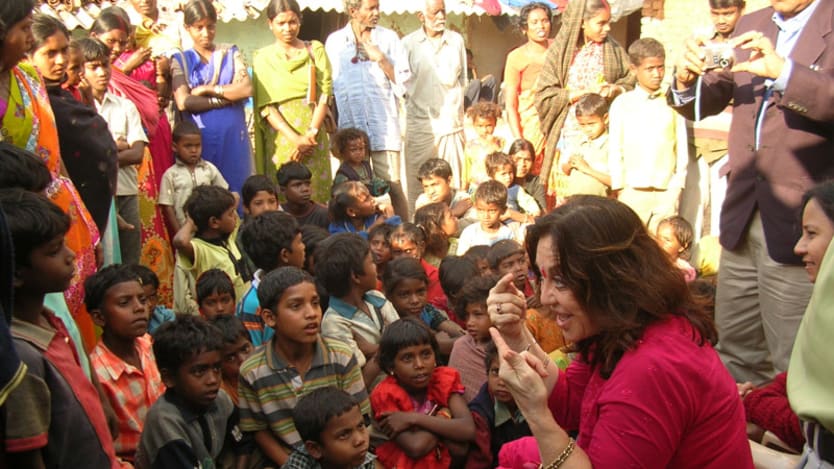
The authors of the proposed sustainable development goals weighed the challenges then put the fight against poverty at the top of their list. Albina du Boisrouvray has struggled for more than 25 years to break that cycle.
Du Boisrouvray and her colleagues at the nongovernmental organization she founded, FXB, work in villages around the world. They train people to become self-sufficient within three years by tackling five drivers of poverty: health, food, housing, education and income. In May, du Boisrouvray started sharing her methodology with others. Devex recently talked to her about why she believes this “open-source” approach can move the world closer to ending extreme poverty.
Below are some excerpts from that conversation.
How does it make you feel to see people struggling without the necessities?
My concern when I started this organization was to address the casualties of the AIDS epidemic, the children who were orphaned and infected. I started working in places like Washington, D.C., then in Thailand and Brazil with little houses of tender loving care to take care of just five or six children in a family setting.
I went in with the same idea in Africa. But when I got on site, I saw that there were thousands of orphans. I didn’t know who was infected or not. And I was absolutely devastated. The idea was to raise these kids and to give them the best quality of life possible, to give them access to their basic rights as spelled out in the Convention on the Rights of the Child.
With sights set firmly on SDGs, let's push for wider adoption of best practices
To lift people out of poverty, challenges must be addressed simultaneously. Integrated approaches work better and knowledge sharing is key. Stakeholders must now get on board with what works to meet the SDGs. An exclusive op-ed from FXB founder Countess Albina du Boisrouvray for #SustainDev.
I sat on the ground with the elders, with the women, with everybody concerned, and I explained our way of working. I had learned through Dr. Jonathan Mann’s public health paradigm at Harvard that the only thing that was sustainable was integrated intervention.
People asked, “Why don’t you build a school for the orphans?” I said, “That’s just one right. When the children come home, how are they going to eat. And who is going to take care of their health?” Then, they asked, “Why don’t you build a hospital that would take only people infected with AIDS?” They didn’t understand the need for integration.
Finally, a woman came up to me and said, “If FXB gave me a cow, I could put milk on the table, and I could feed the children better. I could take the milk to the market, and with that money I could pay the school fees.” She understood, and that’s how we started the FXB Village. It was a really a common effort and a common partnership among the women of the community and myself and FXB.
How much do things change over three years in an FXB Village?
I went to Rwanda in 1995, shortly after the end of the genocide. I thought, “How can I help people get out of poverty if they don’t have a house?” So we decided to build 528 homes. When those homes were built the following year, we put the FXB Village model into place.
There was a woman who I saw with the refugees who was absolutely miserable. She had seven or eight children. They were famished. She was sick. She looked bedraggled. Two years later, I went back, and I saw the woman running through the banana fields. She said, “I want to show you what I’ve done. I want to show you how my children are all going to school and the grades they’re getting.” It was such a change of behavior, such a change in the way she held herself. She was empowered. She was self-assured. Of course, we could show the changes statistically. But people who are gaining their dignity, people who are gaining their self-sufficiency and their autonomy and who feel proud, that’s a huge success.
What are some of the greatest challenges in your work?
First of all, you have to adapt to local conditions. Sometimes you have high HIV rates because of drug and alcohol abuse. You have poor health, poor hygiene practices, minimal nutrition and places where there is no education at all. You have to fight against all these factors in year one.
Another big challenge is the attitude of governments. For instance, the Indian government was looking at how to eliminate extreme poverty in rural areas. I went to the planning commission and shared our methodology. They said, “This is wonderful except we don’t know how to fund it because our funding comes in silos. Every ministry funds one item. But your integrated program cuts across all the silos.” There was no way they could change that in a year.
People always think you have to multiply the program. But the success comes from remaining small — 80 to 100 families — with the staff staying near the families. Keeping it at this level allows the staff to be vigilant on all the details of people’s lives. If you multiply that, it’s just not going to work. You won’t have the sense of family and the sense of ownership, which is the success of the program.
How important is it to give people a voice about where the U.N. is headed in development?
It’s crucial. We have been working for years on the Millennium Development Goals. But they haven’t all been fulfilled in the way they should have been. So we have a lot of work to do as we look to the SDGs. They may look like a long wish list. But we all have to work with one shared vision, a world without poverty.
If you’re ending poverty, that leads to global peace and security. And it is a cost-effective investment. An FXB Village costs between $130 and $230 per person per year over three years to get people out of extreme poverty, to get them self-sustainable, to be able to raise their kids, giving them access to their basic rights.
What is one thing you want people to take away from the discussion about the SDGs?
It would be that the public hold the government, hold the U.N., hold everybody who has power and money accountable to every commitment on poverty eradication. It’s important that people in a democracy really be able to express themselves. But the SDGs should not remain the sole responsibility of governments and U.N. agencies. Civil society really has to feel a responsibility.
People have to understand what the goals pertain to. They have to understand what solutions can be brought and push the governments, the decision-makers, the money-givers and the corporations to put the goals in place in the right way. We need public opinion to push for what is right, to get the world in a better place.
Sustaining Development is a three-month online series exploring the post-2015 development agenda hosted by Devex in partnership with Chevron, FXB, Global Health Fellows Program II, Philips, Pfizer, UNIDO, U.N. Volunteers and the U.S. Council for International Business. We will look at the practical steps needed to move the sustainable development goals from concept to reality. Visit the campaign site and join the conversation using #SustainDev.
Search for articles
Most Read
- 1
- 2
- 3
- 4
- 5








